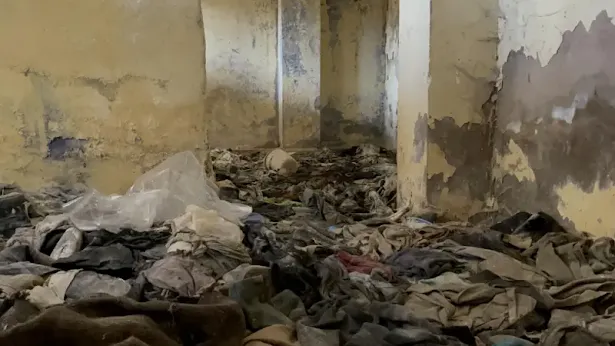The mysterious prisoner released from Syria's notorious prison, to whom several families are claiming to be related
Hussam AssalAheda, BBC Arabic, AmmanDecember 18, 2024
Pros:
1. Human Interest:
The story taps into emotions and draws attention to the plight of families affected by Syria's oppressive regime, evoking empathy.
2. Mystery Factor:
The unidentified prisoner and conflicting claims intrigue readers, encouraging engagement and discussions.
3. Awareness:
Highlights the conditions of Syria’s notorious prisons and the ongoing human rights issues, shedding light on a critical topic.
4. Broad Appeal:
The combination of mystery and human tragedy resonates with a global audience.
Cons:
1. Verification Challenge:
Conflicting family claims may complicate confirming the prisoner’s identity, leading to speculation and misinformation.
2. Sensitivity Issues:
Reporting on personal tragedies can unintentionally exploit vulnerable families or exacerbate their pain.
3. Limited Context:
Without background on Syria’s prison system or the prisoner’s history, the story might lack depth for some audiences.
4. Risk of Sensationalism:
Overemphasis on mystery could overshadow the humanitarian aspect of the story, detracting from its importance.
After the fall of Bashar al-Assad's regime in Syria, Jordanian resident Bashir al-Battaineh was desperately waiting for the return of his son Osama, who had been missing for 38 years.
Bashir al-Battaineh, a resident of the northern Jordanian city of Irbid, is 83 years old. According to him, Osama had asked permission to go to Syria for a week during the summer holidays of 1986. He wanted to visit before the start of his final year of secondary school, but then he never returned.
After almost four decades, Bashir al-Battaineh received the news that he and his family had been praying for for a long time.
A video emerged showing a man saying, "I am from Irbid" after being released from Saydnaya prison near Damascus.
The Jordanian Foreign Ministry then announced that a Jordanian citizen named Osama had arrived in Jordan and that the man had lost his memory.
Shortly afterwards, authorities arranged for Bashir al-Batayneh and his family to meet Osama.
Al-Batayneh told the BBC that "he held my hand for a long time and then started kissing it."
He compared Osama to "a skeleton" and said, "He has lost his memory and his appearance is heartbreaking... his facial features have changed."
Osama's sister told the BBC that Osama had also called her mother's name and was recognising himself in old family photos.
But then the story took an unexpected turn.
Jordan and Syria share a 360-kilometer border.
The man was transferred to the Jordanian capital Amman, where a DNA test revealed that he was not genetically related to the Batayneh family.
The uncertainty about the man’s identity grew when several claims emerged on social media.
One person claimed on Facebook that the man in the video was actually a Syrian from the city of Tartus and that they had both been in prison together.
Another woman claimed on Facebook that the man was a resident of Kafroon Saada, a village near Tartus, and that he was “kidnapped by Syrian intelligence agencies from Beirut in 1986.”
Catalina Saada says the man resembles her relative Habib Saada, who was kidnapped from the Syrian capital Damascus and transferred to a Syrian prison. She says her family learned two and a half years ago that her grandfather's brother was being held in the notorious Saydnaya prison, where thousands of people who have been critical of the Syrian government are being held.
Her family wants to confirm through DNA testing that they are indeed her relatives.
"We will send the tests to (the Jordanian authorities) where the missing man is and a DNA sample will also be taken from my grandfather in the village of Kafrun Saada. If my grandfather finds his brother, he will breathe a sigh of relief," Catalina Saada told the BBC.
Nedal al-Bataineh, a former Jordanian labor minister who spent time with the man in Jordan, said she had also received calls from several people claiming that the man was their relative.
Nidal has asked the families to send her a DNA test.
A picture of a secret room in Saydnaya prison
Meanwhile, in Jordan, Qassem Bashtawi and his family believe the man who was released is Qassem's cousin Ahmed.
Qassem Bashtawi told the BBC that his cousin was a Palestinian fighter who was kidnapped from Lebanon and transferred to Syria.
According to Qassem, a prisoner who was released in 1995 told his family that Ahmed was in Saydnaya prison. They tried to reach him in prison but were silenced by security forces in Syria.
The Bashtawi family is also planning to have a DNA test.
'We are waiting for God's mercy'
For the Bataina family, it is very disappointing that the DNA test has confirmed that the released prisoner is not their relative.
"We can't do anything, we're just waiting for God's mercy," Osama's brother, Mohammed al-Batayneh, told the BBC.
The al-Batayneh family say their father did everything he could to find out about their son, and his mother went blind in grief and died a few years ago.
"We have never stopped looking for him since his capture and we are still trying to ask people in Syria about him to find out if he is alive or dead," Mohammed al-Batayneh said.
He says he is troubled by stories circulating on social media claiming that bodies were allegedly thrown into acid at Saydnaya prison.
However, the al-Batayneh family does not want to give up hope and wants to continue the search for the missing Osama.
Related Topics
#Syria #Middle_East











No comments: